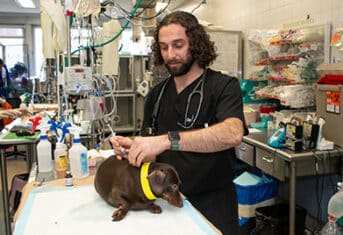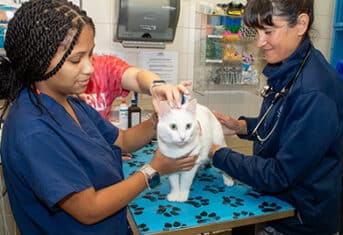Veterinary Research: A Year in Review

Veterinary Research: A Year in Review
Veterinary research results in new treatments, procedures and tests leading to improved pet healthcare. For the first blog of 2016, Fur the Love of Pets will review some of the research published in 2015 which has had a positive impact on the care of dogs and cats.
Rabies Vaccination
While it is important to keep both your dog and your cat up to date on vaccinations, sometimes life gets in the way and you are a bit late making it to your veterinarian’s office. Researchers at Kansas State University studied dogs and cats whose rabies vaccination had lapsed and monitored their immune response to revaccination.
This study found both dogs and cats respond well to revaccination, regaining immunity against infection with the rabies virus within 5-15 days following revaccination. So make your New Year’s resolution to see your veterinarian ASAP and get your pet protected against rabies.
Preventing Cat Vomiting
Every cat lover learns to deal with some amount of cold, clammy cat vomit stuck to the carpet or bedspread. Cats with chronic kidney disease are some of the worst vomiting culprits because of the nausea associated with failing kidneys. In a randomized, controlled and blinded clinical trial published in the Journal of Feline Medicine and Surgery, cats with chronic kidney disease, receiving the anti-nausea drug maropitant vomited significantly fewer times than those cats not receiving the anti-nausea medication.
Good news for cats because maropitant is administered as an oral tablet only once a day. Good news for your carpets too!
Getting a Better Urine Sample
Evaluation of a urine sample is a critical part of a complete diagnostic evaluation. How a urine sample is obtained is nearly as important as the test itself. If the urine is to be tested for bacteria, we want a very clean sample. Veterinarians also frequently test urine for protein levels, but the optimal sample is unknown. A research study published in the Journal of Veterinary Internal Medicine evaluated protein levels in urine from dogs collected at home versus in the clinic. Samples obtained at home were more accurate than those obtained in the clinic – showing what we already know – there’s no place like home! Next time your pet needs to visit the veterinarian, collect a urine sample in a clean jar and bring it with you to the appointment.
Feline Fecal Flotation
A common test in general veterinary practice is the fecal floatation. This test identifies the eggs of stomach and intestinal parasites (worms). The eggs are shed by the parasite into the intestinal tract. When the eggs are identified, your veterinarian can provide specific treatment to eradicate the parasite affecting your cat. This study evaluated how often the fecal floatation correctly identified the presence of parasites.
The results of this study found more often than not, parasite infections were not identified by a fecal floatation. Cat owners should understand, when the clinical signs are typical of parasite infestation, their veterinarian may prescribe broad spectrum deworming medications even if the fecal floatation is negative.
Many more excellent research studies were published in 2015, which help your veterinarian take better care of your pets, making 2016 a happy AND healthy new year for your cat and dog.































